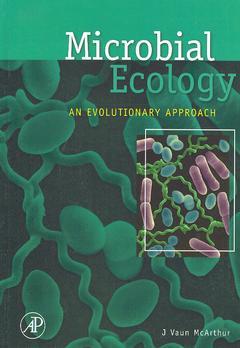Description
Microbial Ecology
An Evolutionary Approach
Author: McArthur J Vaun
Language: English
Subjects for Microbial Ecology:
Keywords
virus; bacteria; species diversity; fungi; microbial reproduction; nutrient cycling; biofilm
Publication date: 03-2006
432 p. · 18.2x26 cm · Hardback
432 p. · 18.2x26 cm · Hardback
Description
/li>Contents
/li>Readership
/li>Biography
/li>Comment
/li>
Based on the thesis that insights into both evolution and ecology can be obtained through the study of microorganismsm, Microbial Ecology examines microbiology through the lens of evolutionary ecology. Measured from a microbial perspective, this text covers such topics as optimal foraging, genome, reduction, novel evolutionary mechanisms, bacterial speciation, and r and K selection. Numerous aspects of microbial existence are also discussed and include: species competition, predation, parasitism, mutualism, microbial communication through quorum sensing and other. The result is a context for understanding microbes in nature and a framework for microbiologists working in industry, medicine, and the environment.
SECTION I. Ecology and Evolution
Chapter 1. Introduction
Chapter 2. Molecules and Origins of Life
Chapter 3. Species concepts and speciation
SECTION II. Ecology of Individuals
Chapter 4. The Individual
Chapter 5. Growth and Feeding
Chapter 6. Ecology of Sex
SECTION III. Living Together in Populations
Chapter 7. Fundamentals of microbial population ecology
Chapter 8. Metapopulations, Multicellularity, and Modular Growth
Chapter 9. Effects of Habitats, Genome Size, Diversity and Bacterial Communication on Population Processes
Chapter 10. Population Spatial Stability
SECTION IV. Living Together in Communities
Chapter 11. Characteristics of Communities and Diversity
Chapter 12. Concepts in Community Ecology
Chapter 13. Microbes and the Processing of Nutrients
Chapter 14. Species Interactions and Processes
Chapter 15: More Species Interactions
Bibliography
Glossary
Figure Legends
Chapter 1. Introduction
Chapter 2. Molecules and Origins of Life
Chapter 3. Species concepts and speciation
SECTION II. Ecology of Individuals
Chapter 4. The Individual
Chapter 5. Growth and Feeding
Chapter 6. Ecology of Sex
SECTION III. Living Together in Populations
Chapter 7. Fundamentals of microbial population ecology
Chapter 8. Metapopulations, Multicellularity, and Modular Growth
Chapter 9. Effects of Habitats, Genome Size, Diversity and Bacterial Communication on Population Processes
Chapter 10. Population Spatial Stability
SECTION IV. Living Together in Communities
Chapter 11. Characteristics of Communities and Diversity
Chapter 12. Concepts in Community Ecology
Chapter 13. Microbes and the Processing of Nutrients
Chapter 14. Species Interactions and Processes
Chapter 15: More Species Interactions
Bibliography
Glossary
Figure Legends
Students in ecology of microorganisms. Prerequisite would be a general microbiology course. Readers of the following journals: Appllied and Environmental Microbiology, Microbial Ecology, Environmental Microbiology, Ecology, FEMS Microbial Ecology, Ecological Society of America, etc.
Dr. J Vaun McArthur's research interests are quite diverse and span scales from ecological genetics to bacteria to ecosystem level studies with occasional forays into population and communicty ecology of invertebratesa nd microbes. His current emphasis is on the role of indirect selection in the spread of antibiotic resistance in aquatic (freshwater and marine) bacteria. He has taugh General Zoology, Biology, Ecology, Microbial Ecology, Microbiology, Environmental Science, and Limnology. He holds adjunct faculty appointments at the Institute of Ecology at UGA and the Department of Entomology at Clemson University.
- Applies evolutionary ecological concepts to microbes
- Addresses individual, population and community ecology
- Presents species concepts and offers insights on the origin of life and modern microbial ecology
- Examines topics such as species interactions, nutrient cycling, quorum sensing and cheating
© 2024 LAVOISIER S.A.S.




